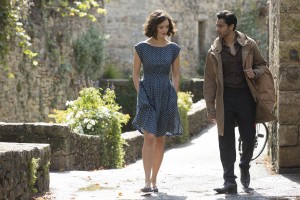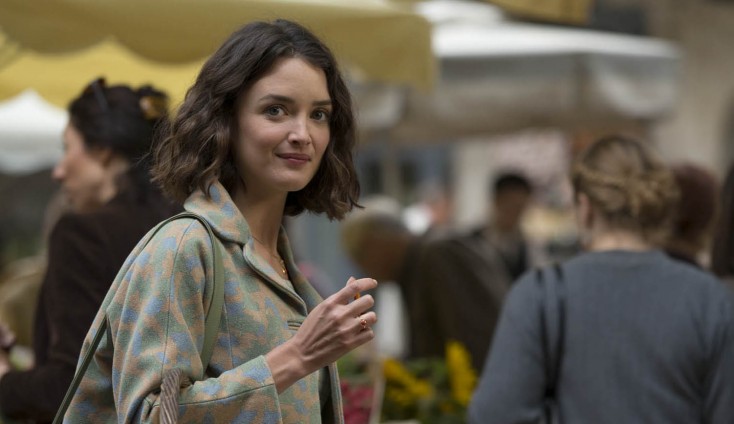
Marguerite (Charlotte Le Bon) and Hassan (Manish Dayal) in DreamWorks Pictures’ charming new film “The Hundred-Foot Journey.” ©Dreamworks. CR: Francois Duhamel.
By ANGELA DAWSON
Front Row Features
HOLLYWOOD—YouTube has replaced Schwab’s Pharmacy as the place for aspiring film actresses to be discovered. Just as Lana Turner was purportedly discovered sitting at the drug store counter by Mervyn Leroy back in the day, French-Canadian actress Charlotte Le Bon was spotted doing one of her comic weather forecasts on French TV by uber-producer Steven Spielberg, which convinced him to bring her in to audition for the romantic comedy “The Hundred-Foot Journey.”
According to the Academy Award-winning filmmaker, “I realized that anybody that beautiful who can be that funny is a soufflé, and we had to get her in this film.”
Spielberg, along with Oprah Winfrey, produced the comedy, based on the Richard C. Morais bestseller, in which an Indian family moves across the street from a high-end restaurant in the French countryside, creating a rivalry between the snooty French proprietress and the patriarch of the Indian family, who turns his property into loud and fragrant Indian restaurant.
The 27-year-old Le Bon plays a sous chef employed by Helen Mirren’s restaurateur Madame Mallory, who eventually agrees to teach French cooking to the teenage son of the cook across the street. As Le Bon’s Marguerite and Manish Dayal’s Hassan bond over sauces and soufflés in the kitchen, a romance also begins to bubble. Swedish filmmaker Lasse Hallstrom (“The Cider House Rules,” “Chocolat”) directs the mouth-watering comedy.
It’s easy to see why the 27-year-old brunette captivated Spielberg. On screen and in person, the pretty and perky Le Bon is reminiscent of both Audrey Hepburn and Audrey Tautou. Speaking English with lilting French accent, Le Bon recently spoke about her fortuitous discovery, what it was like playing a sous chef and working opposite Dame Helen Mirren.
Q: Do you consider yourself a food person?
Le Bon: I love eating, that’s for sure, because I’m a normal human being. I’m not like a great cook.
Q: If somebody’s coming over, is there one dish that you can make?
Le Bon: Yeah, I will probably do something that looks difficult but isn’t really, like queso mont d’Or, just to impress.
Q: Tell me about how Steven Spielberg discovered you.
Le Bon: I did weathercasting for a TV show called (translated) “The Grand Journal,” about news and celebrities. I was just doing my silly stuff. So I think (Spielberg) saw me on the Internet, and then when he saw me on tape after I did the casting in France and he recognized me. He went on YouTube, because all of my sketches are on there, and he said, “It’s crazy because I saw this girl who was getting very very far and sometimes humiliated, but she’s still going for it.” So maybe that’s what he liked about it.
Q: Marguerite seems like a timeless French country girl. Did you feel that way playing her?
Le Bon: Yes, but also the movie itself is that way. Before Hassan goes to Paris (to train professionally), you don’t really know in what period the movie is set. I kind of like that. I know that Lasse (Hallstrom) is very romantic, and he wanted to have this romantic vision of Marguerite, which represents love in the movie for Hassan. That is why he wanted her to be very girly but, at the same time in the kitchen, she’s tough. She knows what she wants and she’s a leader. I like that too. She’s balanced.
Q: At one point, she gets passed up for a promotion by Madame Mallory (Mirren) and shows that she isn’t happy about it.
Le Bon: I really like that about her. Unfortunately, the parts for women are always “the girlfriend,” or waiting for the man, and saying, “You’re better than me. Come into my kitchen and I’ll show you.” They’re all about giving, and it’s not true! Not like that. We’ve got our goals, our dreams and our ambitions. So I really like the scene where she’s being passive-aggressive (with Hassan) when he’s about to enter Madame Mallory’s kitchen. She’s being ironic and she’s right. So I really like that about her. I respect Marguerite.
Q: This movie is about East meets West, and the culture clashes that sometimes arise. Do you have Asian friends?
Le Bon: My boyfriend is Moroccan. It’s a different culture, for sure. The thing is I that cannot understand and don’t understand (racism) because, for me—this might sound cliché or cheesy—but we’re all human beings and we’re all the same so I don’t care if you come from a different country and have a different culture because I know at some point we’re going to meet. I never ask myself that kind of question. I’m happy to meet people and to learn about them and to learn about their cultures because I guess that just makes us richer.
Q: Racism by some of the villagers is addressed in this movie. Do you think this movie is elevated because of that?
Le Bon: Yeah, of course. And it’s really representative of what’s happening in France right now. We’re closing the borders. I don’t know if I can explain this in English but we’re not looking at how we can get richer by having more cultures and mixing and everything. I sound very bad right now because I’m speaking in English, but I promise you that in French, it’s better. (She laughs.)
Q: Were you intimidated working with the great Helen Mirren?
Le Bon: No! Who? Naw! Easy! No, of course. I just had maybe four scenes with her, unfortunately. But I know I want to be like her when I grow up. (She laughs.) That’s for sure. She’s so powerful. She’s the kind of woman who just owns the place, and it was very inspiring to see her work and, actually, to see her struggle sometimes. She’s like everybody else, like every other actress. She’s asking herself questions. She’s changing stuff and talking with the director, and with us too. “Do you agree with what I’m proposing?” and stuff. So it was super-inspiring and so nice.
Q: Since you were working in the French countryside, was it easier to make friends with Manish and some of the other cast members?
Le Bon: Probably. I’m sure it helped. But also, they’re easygoing and amazing people so it was easy to get along with them too. But, yes after each day (of work), we were having dinner in our rooms together and we were hanging out together on the weekends. And Om Puri, who plays the (Hassan’s) father, is exactly like (his character). He hates French food; he thinks it sucks. So every weekend he was organizing a big Indian dinner. I don’t know how he managed to do it, but he was able to go into the creepiest Indian restaurant in Saint Antonin Noble Val, the little village where we were living, and he was able to pick spices and exactly what he wanted to do those really typical Indian dinners. The food was so great. He’s a genius.
Q: How was it working with Lasse Hallstrom? Were you familiar with “Chocolat” and his other films?
Le Bon: Of course. People sometimes ask me what’s my favorite food movie, and I say, “Chocolat,” and it’s not because we’re doing press for this movie. Lasse’s such a romantic and instinctive man, so he likes to work with human beings and the essence of humans. He chooses people on that basis. That’s why he chose me. He wanted Marguerite to have my kind of spirit. He’s also vegan.
Q: Are you vegan?
Le Bon: No, I’m vegetarian. But he’s able to film food like … I think he’s a frustrated vegan. He’s able to make food look so good. Everybody’s starving when they get out of this movie.
Q: You started out as an illustrator. What were you designing?
Le Bon: I don’t know how to describe it. I started illustration when I was a model and I was feeling very lonely. I started modeling when I was 16, and I didn’t make any friends in eight years, because I was traveling a lot. So I had to find something that would feed my soul. So I started to draw a lot. I can show you stuff. Right now, I’m really into hearts. (She shows her drawings on her phone.)
Q: Are you looking to do more Hollywood movies or French movies?
Le Bon: I’m really open to everything. I just did this amazing movie with (Robert) Zemeckis called “The Walk.” It’s about the French high-wire walker Philippe Petit, played by Joseph Gordon-Levitt. I play his girlfriend. It was an incredible experience. I’m really just open to working with inspiring people. I don’t care if they come from France or America or if they’re just artists or painters or illustrators. I want to touch everything.





